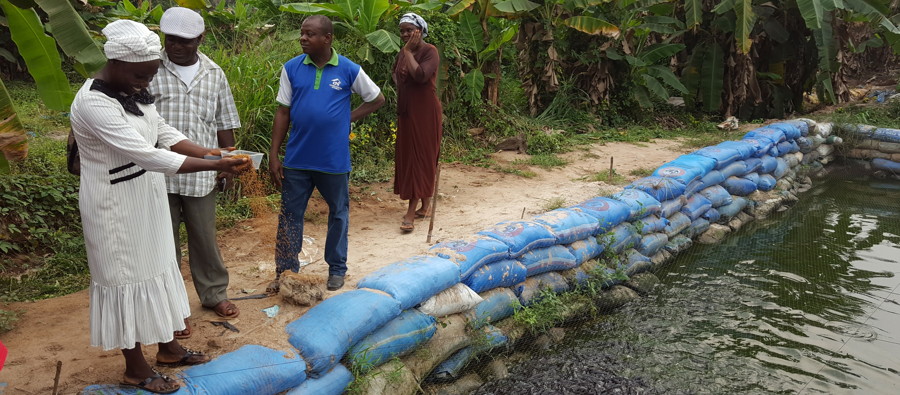Fish farming is a huge industry in Nigeria, but smallholder farmers face several obstacles. Elisa Burrows, Partnership Manager at Fintrac, writes how offering financing for them can open up a world of opportunities.
In the Kano and Sagamu regions of Nigeria, suitable water resources and high market demand mean that aquaculture presents a profitable opportunity for smallholder farmers to expand their farming activities. Yet few farmers take advantage of this opportunity because they lack the technical knowledge fish farming requires and because there are few hatcheries that supply fish to small-scale farmers. To help change this, Chi Farms, a Nigeria-based livestock and aquaculture business, is working with smallholder farmers – primarily women – to develop this business opportunity.
The market opportunity for fish farming in Nigeria is huge. Nigerians consume nearly 2 million tons of fish per year, and the country’s growing population ensures demand will continue to boom. Demand far outweighs current national production, making it necessary to import fish from all over the world. However, in recent years the price of imported fish has increased significantly because of the devaluation of the Nigerian naira. Even though fish is a key ingredient in many Nigerian dishes and an important and efficiently produced source of protein (for every kilogram of fish feed, a kilogram of fish is produced), only half the fish consumed by Nigerians is sourced locally. To increase local production, Chi Farms is partnering with Feed the Future Partnering for Innovation, a Fintrac-implemented USAID program that invests in private sector partnerships to commercialize agricultural innovations in smallholder markets, to increase Chi Farms’ capacity to supply fish to farmers and build teams of aquaculture specialists to provide extension services.
Access to newly hatched fish, or fingerlings, in small quantities is a significant constraint to small-scale farmers interested in aquaculture. Commercial hatcheries are not common in Nigeria, and those that are established typically produce fingerlings to grow to consumption size or for sale to large-scale fish farms. Chi Farms is targeting Segamu and Kano as priority regions because the consumption of fish among households is high but access to fresh fish is low; fish here is mostly sold as dried or processed. There are no large hatcheries, so farmers interested in raising fish buy fingerlings in the local markets, which are often of low quality and prone to disease. Furthermore, these small-scale farmers often lack access to feed and resign to feeding their fish waste from other farm production, such as rice or maize husks. This feed does not provide proper nutrition, resulting in lower yields and smaller fish.
Chi Farms is building two new hatcheries in Segamu and Kano that will supply quantities of 1,000 fingerlings to small-scale fish farmers. Additionally, Chi Farms will sell high-quality fish feed from its existing feed mill in Segamu, packaging it in appropriate sizes for small-scale farms. The feed is designed to provide fish with proper nutrition at every stage of growth, resulting in faster-growing fish ready for sale in shorter timeframes.
Each hatchery will produce 1 million fingerlings per year, and will provide access in previously underserved geographical areas. Fish farming results in a high-value product that can be produced in a small area with just a few ponds, which makes it very appealing to women, who often have trouble accessing land. In Segamu, Chi Farms has organized 500 farmers, 68 percent of whom are women, to receive training and inputs for successful fish raising, and the company is recruiting an additional 500 farmers in Kano. To help farmers with little to no experience with aquaculture build successful aquaculture businesses, Chi Farms’ client focus teams – which consist of university-educated aquaculture specialists – train farmers in topics that include good aquaculture practices as well as financial management and farming as a business. Client focus teams also help more experienced fish farmers set up demonstration ponds that will serve to educate other farmers in their community in good aquaculture practices and show the business potential of fish farming.
Lack of financing is one of the largest obstacles small-scale farmers face, especially women who rarely have the financial history needed to qualify for loans. Understanding that access to finance and purchasing quality inputs are critical to success, Chi Farms partnered with Women’s World Banking to facilitate access to financing for its farmers. Women’s World Banking advised on a number of financing models that work well for smallholder farmers, some of which Chi Farms is currently testing. In many models Chi Farms acts as a guaranteed buyer, which provides the financing partner more confidence the loan will be repaid. Using the loans to purchase quality fingerlings and feed from Chi Farms, while simultaneously receiving technical support from the client focus teams, is enabling farmers to produce high-quality catfish for both home consumption and for sale back to Chi Farms. Chi Farms sells the whole fish to national retailers, restaurants, and hotel chains, and has started to process some of the fish into new product lines for trial sales at urban retailers.
Fish farming represents a major market opportunity for smallholder farmers in Nigeria, and Chi Farms is helping farmers, especially women, take advantage of it to build sustainable, long-term sources of income. By providing farmers with inputs, education in aquaculture best practices, and technical support throughout the production cycle, Chi Farms is helping support small business growth for women. And by facilitating financial access and market linkage Chi Farms is building a sustainable aquaculture sector in Nigeria.
This post originally appeared in the March edition of WFO’s Farmletter.



